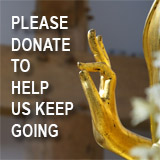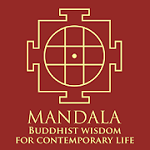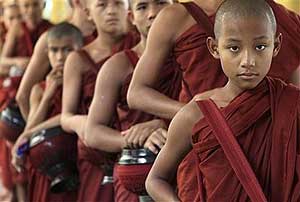
|
|
|
Home Asia Pacific South East Asia Myanmar Myanmar Protest News Burmese monks key to democracy process: rights groupRadio Australia, September 16, 2009
Sydney, Australia -- Human Rights Watch says the US government is moving too slowly in announcing its new policy on Burma, with the delay giving the regime in Rangoon too much space.
MATHIESON: Well the human rights situation we think is actually deteriorated in the last couple of years. There are now more than 2,200 political prisoners throughout the country. Aung San Suu Kyi, the Democracy leader is back under house arrest for another year-and-a-half after a ridiculous sham trial earlier this year and there is still fighting and attacks against civilians in ethnic conflict areas in eastern Burma and northern Burma. And throughout the country basic freedoms are still denied - freedom of assembly, freedom of association and freedom of the press. It's quite a grim situation. LAM: And I understand that Human Rights Watch is also releasing a report very soon on political prisoners. What can you tell us about that?
And we wanted to broaden out the understanding of who some of these prisoners are, not make it just about Aung San Suu Kyi, but make it about people like Su Su Nway, who is a young female labour activist, a very brave woman. U Gamibira, a 30 year old Buddhist monk and some of the journalists and bloggers and artists that have been thrown in prison is setting quite a grim example for the rest of the country not to challenge military rule. So this report is really about humanising and broadening out who some of these prisoners are to a broader international audience. LAM: You mentioned a Buddhist monk there and indeed, some of the main voices of protest have come from the monks. What role does Buddhism play in Burma's democracy efforts? MATHIESON: It plays a very strong role. I mean Burma is a predominantly Buddhist country and Buddhism is certainly integral to the passive resistance of Daw Aung San Sui Kyi for example, but also the remarkable sight of thousands of these Buddhist monks marching down the street nearly two years ago. That shows that the country is in real distress, because Buddhist monks really don't play that kind of public role. They are more a spiritual and community based institution inside the country. And when they took to the streets two years ago, it was to say, the people are suffering, we have had enough and we have to do something about it. And Human Rights Watch is releasing another report next week on the history of Buddhist activism in Burma and showing the monks taking to the streets and protesting against military rule is not an isolated event. LAM: The military junta of course is quite keen to prevent Aung San Suu Kyi, the pro-democracy leader from taking part in general elections next year. Now, imperfect as it is, the electoral process, do you see any sort of independent voices coming out, forming parties, wanting to take part? MATHIESON: I think we would certainly like to see that, but unfortunately given the current situation, given that Aung San Suu Kyi is being put under house arrest for another year-and-a-half and all these people who should be leading political parties and contesting the elections and journalists who should be covering it. As long as all these people are in prison, many other people throughout Burma that would like to contest the elections, would like to take a more public role in the affairs of their own country, are just to afraid to do that and that's exactly why the military government is throwing people in prison. It's to set an example, which is to say .. and the generals call what they are doing "discipline democracy," which is obviously oxymoronic in some respects, and they are making the entire country fearful of actually taking part. They have a script that they want the country to follow, which is democratic elections, a civilian parliament that will maintain future military rule. |
 Get your Korean Buddhist News here, brought to you by BTN-Buddhist Channel |
 |
 The Mandala app brings together Buddhist wisdom and meditation techniques with the latest insights of psychology and neuroscience to handle the challenges and complexities of modern life. The App offers a series of engaging talks and conversations with experts on a wide variety of topics, such as managing stress, dealing with adversity, developing greater resilience, cultivating empathy and compassion, creating healthy relationships, and many more. These topics are explored to help find greater peace, meaning and joy in our lives. Our panel of experts include Dr, Thupten Jinpa, Daniel Goleman, Kelly McGonigal and others.FREE DOWNLOAD here |
| Point
your feed reader to this location |
| Submit an Article |
| Write to the Editor |

 In this talk show hosted by Radio Australia, presenter Sen Lam speaks to David Mathieson, a Human Rights Watch Burma researcher
In this talk show hosted by Radio Australia, presenter Sen Lam speaks to David Mathieson, a Human Rights Watch Burma researcher